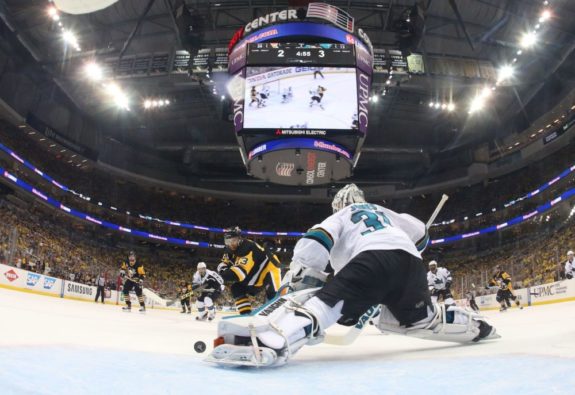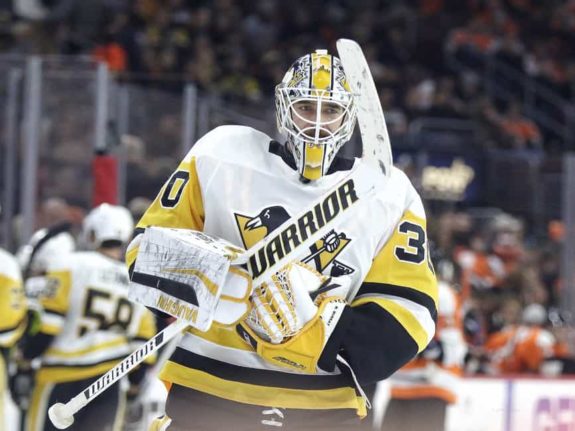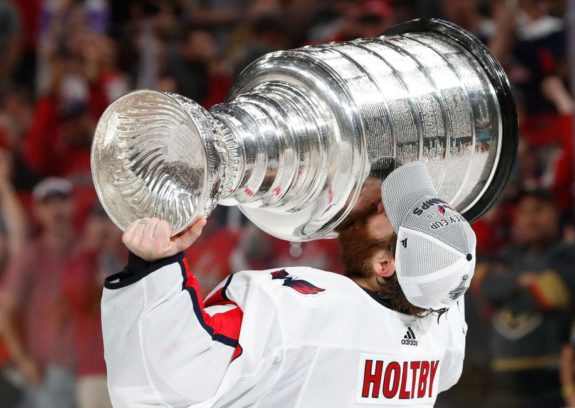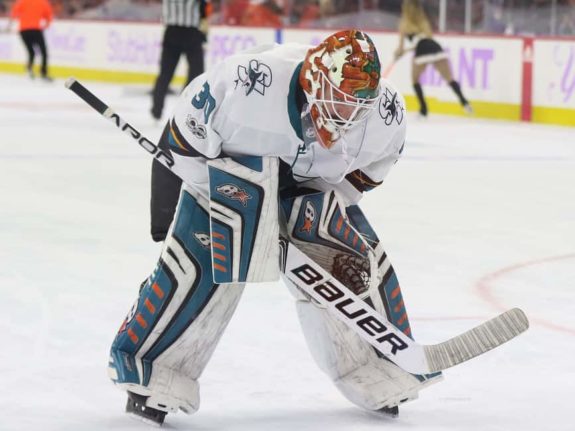As the San Jose Sharks head towards their Oct. 3 season opener, we continue our season preview. We’ve covered the team’s pre-Erik Karlsson trade roster, our expectations for the division opponents and the Sharks’ area of greatest vulnerability. I’ve taken a look at important side effects of the Karlsson trade, and my colleague, Mac Bass, offered his take on the deal as well. Most recently, we looked at the team’s X-factors.
Today we’re beginning our look at some not-so-obvious statistics and seeing how they can impact the choices the Sharks are starting to make now. I’ve identified three important sets of statistics that might lead to some unorthodox choices for head coach Peter DeBoer. The numbers won’t lie, but some may interpret these differently than I will. My sense is, in each case, they have enough merit for the coach to seriously consider the implications and make decisions that account for what the numbers are saying.
In this first piece, we’ll cover a statistic that relates to Stanley Cup winners. And given the Sharks’ sky-high expectations, this has a lot of meaning for the Sharks. It relates to goalies and Sharks starter Martin Jones.

Regular-Season Goalie Usage
One might think there is an obvious correlation between regular-season goalie usage and being the starting goalie on the Stanley Cup champion. The top goalies start the vast majority of their team’s games and lead them on long playoff runs, some culminating with a championship. If one thought that way, one would be wrong. I delved deeply into this subject a few months ago and the numbers were striking.
Roughly half the league’s teams have starting goalies (about 15) top 58 games played (GP). So in the last six seasons, how many goalies exceeded 58 regular-season GP and led their team to a Stanley Cup? Try zero. For six consecutive seasons, no goalie has finished in the top 15 in GP and led his team to a Stanley Cup in that season. It’s only happened twice in the past 10 seasons.
Matt Murray, Martin Jones & Braden Holtby
This seems a perfect stat to have a “yes, but” conversation. I’ll argue it has a “yes, but, but” quality. For example, in the 2016 Stanley Cup Final, the Sharks’ Martin Jones was the stronger goalie compared to the Pittsburgh Penguins’ Matt Murray. Jones’ series included a larcenous win in Game 5.

Jones played 65 regular-season games that season, finishing near the top of the league. Meanwhile, Murray only played 44 (including his AHL games). YES, Murray was on the winning side, BUT Jones was the better goalie. BUT Murray was still good.
Part of the equation is having a goalie who won’t have a down series – or even a down couple of games – and cost his team. It is rare a goalie strings together four spectacular series. What matters more is the absence of a bad series and the ability to bounce back after a bad game or two. Both favor goalies with less wear and tear (mental and physical). Goalies who aren’t as taxed during the regular season seem better able to survive the two-month long Stanley Cup Playoffs without hitting a slump. Murray gave his team a chance to win every series. In the Final, he allowed only a single goal three times while posting a save percentage of .923 or better in four of the six games. Murray played well enough to insure the Sharks hot goalie wasn’t going to steal the series. Could Jones steal a game? Yes. A series? No.
Last season was more typical of the last decade. Washington Capitals goalie Braden Holtby won the Vezina Trophy as the league’s top netminder in 2016, playing in 66 games. But that season, the Caps lost in the second round to Murray’s Penguins. During the 2017-18 season, Holtby played far fewer regular-season games (54), wasn’t particularly good and posted the lowest save percentage of his career.

But come playoff time, Holtby was strong and it paid off during the Caps run to the Stanley Cup. Especially noteworthy are the back-to-back shutout wins against the Tampa Bay Lightning in Game 6 and Game 7 of their series. A worn-down goalie is less likely to bounce back (Tampa Bay won the prior three games) and deliver this kind of clutch performance. During the Cup run, he out-dueled former Vezina winner Sergei Bobrovsky, 2018 Vezina finalist Andrei Vasilevskiy, two-time Cup winning goalie Murray and three-time Cup winner Marc-Andre Fleury.
Impacting the Sharks
Last season, Jones played fewer games than in his prior two seasons with San Jose. Injuries he suffered during the season kept him from playing more. Jones still played plenty, hitting the 60-game mark during the regular season after 65 games in each of his prior seasons (he’s also played 40 playoff games in the last three seasons). Yet, the Sharks have a backup goalie capable of handling a bigger load than he has. Aaron Dell is a good goalie. Often very good. He’s now in his third season and he’s proven himself. He can handle more and the Sharks should give it to him.

One statistic which is also worth noting when it comes to Jones: His 2016-17 campaign saw him peak early and his save percentage dropped every month from November through March. Again, last season, Jones was terrific during October and November, the rest of the season was more hit and miss. The warning signs are there, all one needs to do is look at the history.
Sharks Risk, Sharks Reward
One can argue the statistics presented, but it has happened six consecutive times and eight times in the past 10 seasons. It happens too often to be considered a fluke.
So what can coach DeBoer do about this? Well, this one is easy.
This is one of those statistics where DeBoer can move the odds in his favor without losing anything. Aaron Dell has a better winning percentage then Jones during their tenure together in San Jose. And a better save percentage, too. It’s fair to say the Sharks record won’t be appreciably worse with Dell taking more games in net – if history holds, it will be equal or better. Jones can get plenty of regular-season rest which should result in more energy for a long playoff run. This is essentially a no risk scenario, with a very big potential reward: a playoff run where the Sharks’ goalie won’t need to defy the odds.